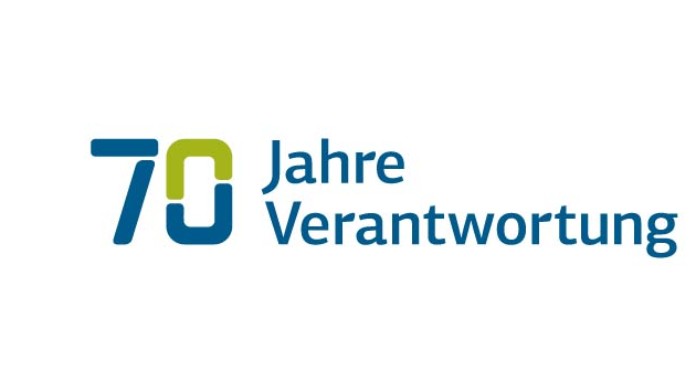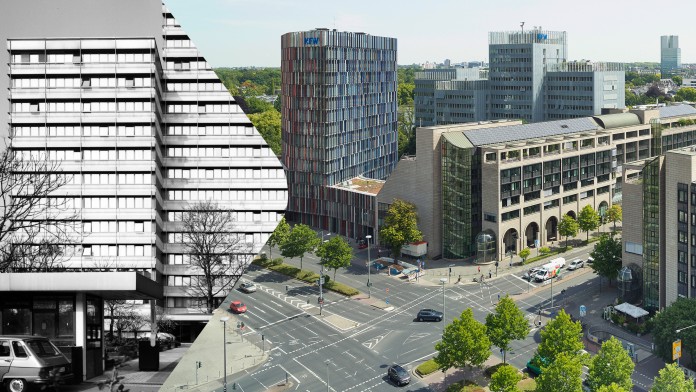Press Release from 2018-11-15 / Group
KfW celebrates 70th anniversary

- Law Concerning KfW entered into force on 18 November 1948
- Institution has been witness to – and protagonist in – Germany’s development over the past seven decades
- Promotional business volume of EUR 1.7 trillion since KfW was founded
- Today, one of the largest national promotional banks and a heavyweight in global bond markets
- Key challenges for the future: sustainability and digital transformation
Embracing “70 years of responsibility” as its motto, KfW is celebrating its 70th year of existence over the coming days. The Law Concerning KfW entered into force on 18 November 1948, giving the starting signal that led to the development of the Kreditanstalt für Wiederaufbau (“Reconstruction Loan Corporation”) into the KfW of today – a promotional bank with global operations, maintaining its headquarters in Frankfurt am Main, along with branches and subsidiaries in Berlin, Bonn, Frankfurt and Cologne, around 80 locations worldwide and more than 6,000 staff. As the self-professed “home of responsible banking”, KfW provides financing packages on favourable terms to support companies, start-up entrepreneurs, local authorities and private individuals. In particular, it promotes investments into new business initiatives, innovations, environmental protection, energy efficiency, municipal and public infrastructure, and access to education. Its key activities also include export promotion and financial cooperation with developing countries and emerging economies. In 2017, KfW committed EUR 76.5 billion in financing, achieving a balance sheet total of EUR 472.3 billion.
In advance of the anniversary, KfW’s CEO, Dr Günther Bräunig, noted: “KfW’s 70th anniversary coincides with 70 years of Germany’s social market economy. KfW has borne witness and given support to this era of economic progress. Post-war reconstruction, national reunification, dealing with the financial crisis, supporting the energy transition and making our contribution to reducing carbon emissions – those have been and continue to be the epoch-making issues that has faced KfW. The challenges have changed over the decades, but at its core, our mission has always remained the same: to support social and economic change, and to advance forward-looking ideas.”
While KfW initially almost exclusively used public funds for its promotional activities, today it largely funds its promotional business on the capital market I is one of the largest and most active issuers of bonds worldwide, from which it refinances its promotional activities. KfW’s total promotional business volume since its founding now stands at around EUR 1.7 trillion.
The promotional bank’s origins are closely tied to the European Recovery Program, also known as the Marshall Plan. Allocated one million marks in equity capital and funds from the ERP, KfW was tasked with supporting the reconstruction of the German economy. The initial priority during the post-war period was residential construction to end the housing shortage. Today, promotional activities for residential construction are closely linked to those for climate protection. Specifically, in 2017, the Energy-efficient Construction and Refurbishment programmes accounted for EUR 14.2 billion of the EUR 18.9 billion earmarked for residential construction investments.
Since the 1970s, the SME sector has become a focus area for KfW. In 1971, KfW launched the first credit programme of its own, which was refinanced exclusively from capital market funds. This “M-Programm” offered smaller companies long-term investment loans via bank onlending. From 1990 onwards, SME support focused on the new states that formerly constituted East Germany. In the first eight years after the Berlin Wall fell, 65,000 businesses in these states received loans for their investments from KfW – a sum totalling more than EUR 25.5 billion.
Funding instruments constantly changing to reflect market developments
KfW’s toolkit of promotional instruments has since undergone constant adaptation. The new approaches have included awarding global loans, promoting the private equity market and securitising SME loans. There was a particular need for KfW to step up in 2009 and 2010, when it helped to keep access to loans open for enterprises and to cushion the impacts of the financial crisis and recession with its special programme (KfW-Sonderprogramm). With a EUR 13.5 billion volume of lending, KfW made a significant contribution to the quick recovery from the crisis in Germany.
In October 2018, KfW again responded to changing market needs by founding KfW Capital in concertation with the Federal Ministry for Economic Affairs and Energy and the Federal Ministry of Finance. The new subsidiary’s mission is to develop the venture capital funding landscape in Germany and Europe, improving access to capital for young, innovative, fast-growing German tech companies in the start-up and growth phase. “The founding of KfW Capital is an example of how KfW has developed a new instrument to combine forces with private market actors and forge ahead with an important matter for the future. Due to its independent and market-oriented structure, KfW Capital will significantly reinforce the ecosystem for growth financing in Germany,” explained Dr Bräunig.
In addition, KfW created an Internet-based start-up platform in early 2018 to strengthen entrepreneurial spirit and boost interest in launching new enterprises in Germany. On this digital platform, potential entrepreneurs receive comprehensive support throughout the entire process of setting up and getting started with their firm.
KfW has also been increasingly involved outside of Germany since the early 1960s. The KfW Development Bank business area finances development projects worldwide on behalf of the German Federal Government. Its ultimate objectives are to improve living conditions and to protect the climate and environment. In this context, KfW supports Germany’s partner countries and provides impetus for progress and development. DEG (Deutsche Investitions- und Entwicklungsgesellschaft), which finances companies in developing countries and emerging economies, has also been a part of KfW since 2001. In 2017, KfW provided a total of EUR 9.7 billion for the promotion of developing countries and emerging economies.
Export and project finance is one of KfW’s longest-standing business areas, dating all the way back to the 1950s. Since 2008, independent KfW subsidiary KfW IPEX-Bank has been responsible for export and project finance.
Environmental financing as early as the 1950s
As far back as the 1950s and 1960s, KfW was the first German promotional institution to support environmental protection measures in water management and agriculture. As environmental consciousness grew during the 1980s, KfW also managed to bring companies on board as customers for its environmental protection programmes. KfW provided substantial funding in the wake of German reunification, in particular to eliminate damage to the environment in the chemical and brown coal-mining regions of the new federal states in the East. Today's promotional efforts to support environmental and climate protection focus on residential construction, as well as energy efficiency in businesses and the municipal sector.
Alongside its promotional activities, KfW also consistently takes on special tasks commissioned by the Federal Government. For instance, it assisted the Federal Government with the privatisation of Deutsche Telekom AG and Deutsche Post AG, and holds shares in EADS and 50Hertz on behalf of the Federal Government.
Setbacks provide initial spark for ongoing modernisation process
KfW has also had to contend with some setbacks over its 70-year history. The ongoing existence of IKB was under threat in 2007 as a consequence of its involvement in the US mortgage market. With KfW holding 38% of IKB shares, its rescue resulted in substantial financial burdens. That September, a transfer to already-insolvent investment bank Lehman Brothers lost KfW a significant amount of its reputation, though it was able to recover this in short order – thanks, for instance, to its role in overcoming the financial crisis and economic recession.
At the same time, these results were the starting point for a modernisation process which continues to this day. Milestones along the way have included the digitalisation of bank onlending since 2011 (“BDO 2.0”), the voluntary adoption of the German Banking Act provisions and alignment with the relevant oversight regime by the German Federal Financial Supervisory Authority (BaFin).
Sustainability and digital transformation: key challenges for the years ahead
With seven decades of experience under its belt, KfW today faces two great challenges: sustainability and digital transformation. KfW has been a leader in promoting investments in environmental and climate protection for many years. By 2017, 43% of all its new loan commitments were related to these areas. Today, KfW is one of the capital market’s largest issuers of green bonds (bonds that are explicitly used to refinance investments in environmental and climate protection). Increasingly, KfW is coordinating its involvement in close partnership with other promotional banks. For instance, during the 2018 Annual Meetings of the World Bank in Bali, KfW joined forces with the European Investment Bank and Agence Française de Développement to launch the Clean Oceans Initiative to pool and expand the partners’ activities on marine conservation.
“For KfW, the all-encompassing and consistent focus on sustainability will be one of the major challenges in the years ahead. For this purpose, we have embarked on an ambitious Sustainable Finance Roadmap and we are aiming to make the United Nations’ 17 Sustainable Development Goals, the Paris climate accords and the German Federal Government’s sustainable development strategy, among other targets, an integral part of our sustainability model. In addition, we are applying selection criteria to our financing activities and will be reviewing which commitments to make or not to make in the future,” Dr Bräunig added.
KfW is helping the German economy to keep pace with the continuing changes associated with the digital revolution. Dr Bräunig is calling for stronger commitment from firms, observing that “just a quarter of small and medium-sized businesses are investing in digital transformation projects and they are only putting EUR 18,000 towards these. Many companies still view digitalisation as a cost driver and not as a foundation for new business models.” For this reason, KfW is providing targeted support to companies investing in digital transformation via its ERP Digitalisation and Innovation Loan, which was introduced in May 2017. In its own operations, KfW opened a Digital Office and Innovation Lab in 2016 where new developments in technology and the world of work are tested out and translated into practical application in banking.



Share page
To share the content of this page with your network, click on one of the icons below.
Note on data protection: When you share content, your personal data is transferred to the selected network.
Data protection
Alternatively, you can also copy the short link: https://www.kfw.de/s/enkBbm2w.B5AA
Copy link Link copied